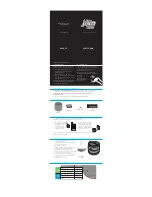
Performer User's Manual PHONIC CORPORATION
page 6
PHONIC CORPORATION Performer User's Manual
page 7
QUICK START
1. Ensure that the POWER switch is off (down) and set the LOW CUT and CONTOUR switches out. Turn
the two volume controls all the way down (counterclockwise).
2. If you plan to use the wireless functions of the Performer, make sure that the proper wireless module(s)
is correctly installed. If you are using the wired configuration, then connect the output from the signal
source (mic- or line-level source) to the matching input on the Performer (mic-level input into the XLR-
type female input jack, and line-level input into the 1/4" phone jack). The Performer accepts balanced or
unbalanced mic- or line-level signals from dynamic microphones, mixers, preamplifiers, CD players, tape
decks, etc. via XLR-type or TRS 1/4" phone connectors.
Note:
The Performer will only accept input from condenser microphones that have their own power supply.
3. Set the VOLTAGE SELECTOR switch to the correct voltage setting for your region (100-120 VAC 60 Hz
or 220-240 VAC 50 Hz). Plug the AC power cord into the IEC socket on the back of the Performer active
speaker. Plug the other end of the power cord into an AC outlet.
4. Set the input selector switch to the appropriate input level. Select MIC (up) for mic-level input; select
LINE (down) for line-level input.
5. Turn on the signal source (i.e. mixer, etc.). Ensure that its Master Volume control is turned all the way
down.
6. Switch on the Performer power switch (down).
7. Start the signal source (i.e. speak into the microphone) and adjust the signal source level settings.
8. Slowly turn up the level control on the Performer until you achieve the desired volume. Make sure that
the PEAK light does not come on.
9. If there is no sound, first turn the Performer level control all the way down before investigating. When you
think you have solved the problem, then repeat step 8 again. Follow Step 9 every time you troubleshoot
until you solve the problem.






































